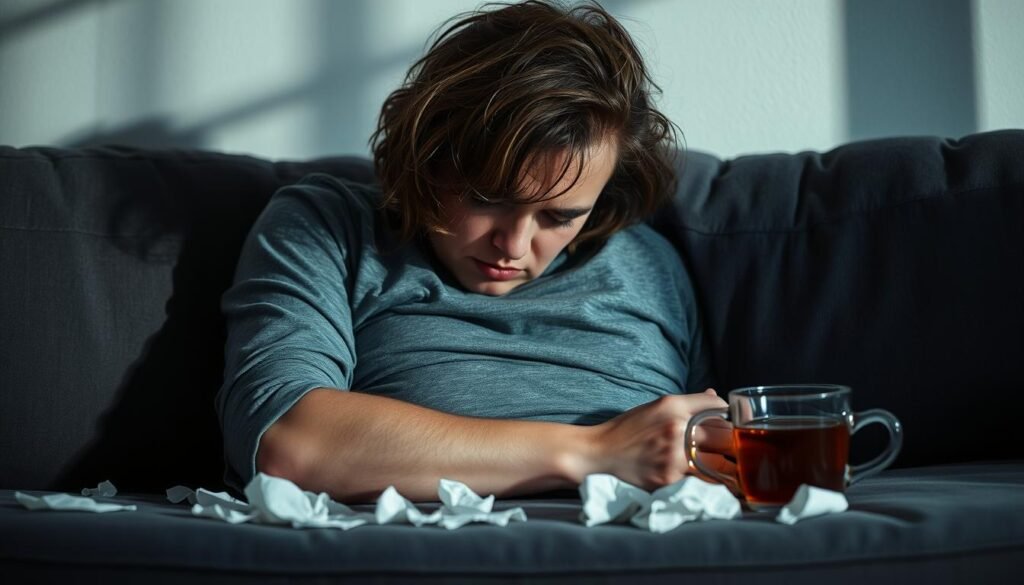Did you know almost one-fourth of American adults experience an anxiety disorder yearly? This fact shows a critical connection between anxiety and fatigue. Many don’t see this link. Anxiety fatigue is a serious condition. It harms both our emotions and our daily energy. Today, we’ll explore anxiety fatigue’s signs and its relationship with anxiety disorders. We’ll also share ways to manage it. By learning about anxiety fatigue, those overwhelmed by anxiety can spot their symptoms. Then, they can find relief and boost their life quality.
Key Takeaways
- Anxiety fatigue affects a significant portion of the adult population in the U.S.
- The condition is linked to various anxiety disorders, including Generalized Anxiety Disorder (GAD).
- Recognizing the signs of anxiety fatigue can lead to better management techniques.
- Chronic stress is a primary factor contributing to anxiety fatigue.
- Effective strategies for relieving anxiety fatigue include mindfulness and physical activity.
- Cognitive Behavioral Therapy (CBT) is an essential tool for treating anxiety disorders.
Introduction to Anxiety and Fatigue
Anxiety is often a natural response to stress in our lives. It comes from worries about things like jobs, money, or personal relationships. For those with anxiety disorders, the impact is much heavier, causing severe fatigue. Around 31% of adults in the U.S. will face an anxiety disorder, feeling physically drained from constant stress.
Chronic stress tends to stir up emotional trouble, sparking bodily responses that bring on fatigue. When anxious, our body releases hormones such as cortisol and adrenaline. These hormones mess with sleeping patterns and how we manage energy. This situation leads to a loop where anxiety hurts sleep, which then increases tiredness.
People might feel very tired, have low energy, or find it hard to focus. Mental and emotional exhaustion may cause burnout, making it harder to deal with these symptoms. Trying to sleep well, practicing mindfulness, and exercising can lessen fatigue from anxiety. Learning ways to handle anxiety, through cognitive behavioral therapy (CBT) or possibly medicines, can be key. For more details on managing these issues, click here.
| Factor | Impact on Anxiety |
|---|---|
| Chronic Stress | Heightens feelings of anxiety and fatigue |
| Sleep Disruption | Contributes to persistent fatigue and irritability |
| Mental Exhaustion | Leads to burnout and difficulty in daily activities |
| Cognitive Behavioral Therapy | Offers effective strategies to manage anxiety symptoms |
| Medications | May reduce symptoms of anxiety and improve overall functioning |
What is Anxiety Fatigue?
Anxiety fatigue happens when you feel tired all the time because of worry and stress. It makes people mentally exhausted. This drains their energy big time. Anxiety can cause muscle tightness, headaches, and trouble sleeping too. Knowing how anxiety leads to feeling so worn out is important. It shows how anxiety fatigue appears in daily life.
Understanding the Link Between Anxiety and Physical Exhaustion
Generalized anxiety disorder (GAD) means feeling too anxious on most days for six months. This includes constant worry, feeling uneasy, and having a hard time focusing. GAD’s physical signs, like heartbeat and muscle changes, make you feel physically exhausted. A drop in adrenaline after being very anxious can make you tired. This can happen even if you sleep.
The Role of Chronic Stress in Anxiety Fatigue
Long-term stress is key to understanding anxiety fatigue. It keeps your body always ready for action. This stress response causes hormone releases that mess up sleep. Bad sleep makes you even more tired and anxious. It’s a tough cycle. Getting enough exercise and eating right can help with these issues. To get more tips on dealing with anxiety fatigue, look at this resource.
Signs of Anxiety Fatigue
Anxiety fatigue happens when you feel really tired because of your anxiety. It’s key to notice the signs of anxiety disorders. Spotting them early can help handle them better.
Common Symptoms Associated with Anxiety Disorders
People with anxiety may face many symptoms that make them very tired. Important symptoms include:
- Persistent worrying or anxiety
- Restlessness and irritability
- Difficulties with concentration
- Muscle tension
- Trouble sleeping, which may lead to fatigue
- Physical symptoms such as sweating, nausea, or trembling
These anxiety symptoms can affect your daily activities and lead to more tiredness. This situation can start a cycle that makes emotional exhaustion worse. People might nap more to feel less tired. But that can mess up their sleep even more.
How Anxiety Can Lead to Emotional Burnout
Emotional burnout is a serious problem from long-term anxiety. It means feeling super tired beyond regular tiredness. It occurs when anxiety’s emotional stress gets too heavy. This can cause someone to pull back and not do as well in life.
Many things lead to this kind of tiredness. These include:
- Crashing feelings after intense anxiety moments
- Constant muscle tightness
- Being mentally worn out and trying to cope
- Napping too much which messes up night sleep
- Having disrupted sleep because of anxiety
- Other issues like depression that can make you more tired
Knowing about these symptoms and effects is crucial for taking care of your mental health. Using relaxation tricks and improving your sleep can help you manage tiredness from anxiety better.

The Impact of Anxiety and Fatigue on Daily Life
Mental exhaustion deeply affects our work and personal lives. It’s important to know how it does this. This knowledge helps tackle anxiety at work and stress in relationships caused by fatigue.
How Mental Exhaustion Affects Work and Relationships
Mental exhaustion can lower your work productivity and focus. Symptoms like trouble focusing and feeling tired all the time make it hard to meet deadlines. Anxiety at work can make it tough to think clearly or be creative, hurting your performance.
In personal relationships, not dealing with anxiety can lead to being easily upset and pulling away from others. People might start keeping to themselves or find talking hard, which increases stress in relationships. Over time, this can harm friendships and family ties, showing why it’s important to get help.
Long-term Consequences of Untreated Anxiety Fatigue
Not dealing with anxiety fatigue can cause serious issues later on. It can lead to heart problems, especially if you’re already not healthy. Staying tired all the time can also hurt your ability to make decisions or remember things well.
If anxiety isn’t treated, it could lead to depression. In depression, hope feels lost, and daily tasks seem too hard. Life’s quality goes down, underlining the need to address mental exhaustion for one’s health and happiness.

| Impact Area | Short-term Effects | Long-term Consequences |
|---|---|---|
| Work Performance | Decreased productivity, impaired focus | Job loss, career stagnation |
| Personal Relationships | Irritability, social withdrawal | Isolation, strained relationships |
| Physical Health | Fatigue, increased tension | High blood pressure, heart disease |
| Mental Health | Difficulty concentrating, anxiety episodes | Chronic anxiety, depression |
Coping Strategies for Managing Anxiety Fatigue
Dealing with anxiety fatigue means blending smart strategies with self-care. Using stress management methods can greatly boost well-being. These methods help lower anxiety and the tiredness that comes with it.
Effective Stress Management Techniques
Using stress management strategies is key in fighting anxiety fatigue. Deep breathing, yoga, and meditation are top coping ways. They help cut down on anxiety, which in turn reduces fatigue. Also, by setting doable goals and sorting out daily tasks, you can keep workload in check. This lessens overwhelm and boosts well-being.
Incorporating Self-Care Techniques into Your Routine
Self-care is vital against anxiety fatigue. Activities like regular exercise, eating well, and keeping a steady sleep schedule help. Adding fun, relaxing things to your day is important, too. This balance gives you control over life’s stress. For extra self-care tips, check out self-help resources. They offer advice on staying hydrated, eating right, and reducing stress.

| Self-Care Technique | Benefits |
|---|---|
| Regular Exercise | Boosts endorphins, reduces stress, combats fatigue |
| Healthy Eating | Improves physical health, stabilizes mood, enhances energy |
| Consistent Sleep Schedule | Restores energy, enhances focus, reduces irritability |
| Relaxation Practices | Calms the mind, reduces anxiety, boosts confidence |
Adding these strategies into your life is crucial for dealing with anxiety fatigue. By focusing on self-care techniques and managing stress, you can get back your energy and live better.
Physical Activity and Anxiety Fatigue
Regular exercise is a top way to fight anxiety fatigue. Studies show that being active helps lower anxiety and boost mood. The CDC suggests 150 minutes of aerobic activity each week for mental health benefits. Exercise not only helps your body but also your mind, which is key in managing anxiety.
The Benefits of Regular Exercise for Reducing Anxiety
About 40 million adults in the U.S. have anxiety disorders. Regular physical activity is linked to reduced anxiety and depression. It’s especially true for those not active before. People who exercise vigorously are 25% less likely to develop depression or anxiety in five years. Even a short 10-minute workout can decrease anxiety and depression symptoms.
How Physical Health Improvements Enhance Mental Well-being
Staying active brings many health perks, like better heart health, weight control, and more energy. Adults are advised to do 1¼ hours of high-intensity exercise weekly. As your physical health improves, you’ll likely sleep better and feel more energetic. These are both important for dealing with anxiety fatigue. Studies show that one intense exercise session can reduce anxiety for hours.
A little aerobic exercise can have anti-anxiety benefits. Activities such as walking, running, or yoga are great coping tools. More adults now see the stress-relief benefits of regular exercise. This helps improve life quality and emotional strength.
Mindfulness Practices for Relief
In today’s world, we often move too fast. Mindfulness has become key for calming our minds. It lets us control our thoughts and feelings better. This leads to more peace and clear thinking. By being mindful, we can feel better overall.
Types of Mindfulness Techniques Effective Against Anxiety
There are many ways to use mindfulness against stress. Here are some:
- Meditation: Meditation makes us live in the moment. This helps lessen anxiety.
- Guided Imagery: Imagining calm places can quiet the mind and ease stress.
- Progressive Muscle Relaxation: This technique makes us relax our bodies. It teaches us to notice how our bodies feel, which lowers anxiety.
Techniques like the body scan meditation connect us with our physical feelings. They make us more aware and less anxious. Studies show these methods really make us healthier in mind. They are good for anyone feeling stressed or anxious.
Implementing Mindfulness in Daily Activities
Adding mindfulness to our day can change our lives. You can start with these simple steps:
- Mindful Eating: Be aware when you eat. It helps you make better food choices and stop stress-eating.
- Mindful Walking: Paying attention to how it feels to walk outside brings us closer to nature. It also brings peace.
- Engaging in Relaxing Hobbies: Taking time for fun activities helps mindfulness grow in a happy space.
Doing these mindfulness activities often brings clear benefits. You may sleep better, feel less anxious, and be happier. Making these practices a part of your life helps calm your mind. You’ll handle stress much better.
Cognitive Behavioral Therapy (CBT) as a Treatment Method
Cognitive Behavioral Therapy (CBT) is a top treatment for various anxiety disorders. It helps people change bad thought patterns and behaviors. Significant research shows CBT benefits in reducing anxiety symptoms and boosting emotional strength.
Understanding CBT and Its Benefits for Anxiety Disorders
CBT teaches people to identify what triggers their anxiety. It also helps them find better ways to cope. About 85% feel better after CBT. This shows its wide use in treating mental health, including chronic fatigue.
How CBT Helps Alleviate Symptoms of Anxiety Fatigue
CBT offers ways to control emotions effectively. This is key in fighting anxiety fatigue. It helps break the chronic anxiety loop.
With the right help, many improve their well-being. They tackle daily issues better, like stress from relationships or work. This leads to better social life and overall happiness.